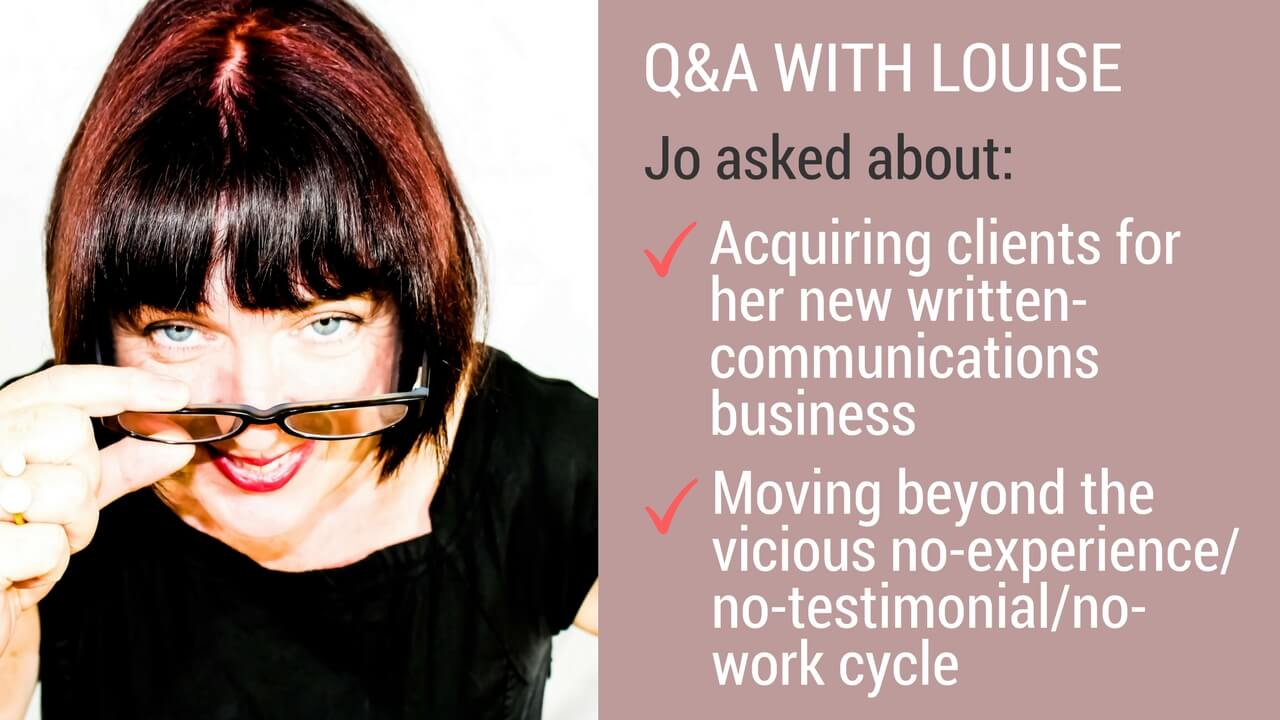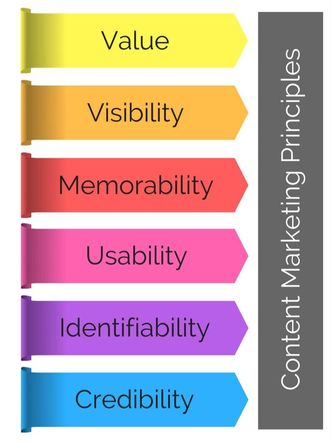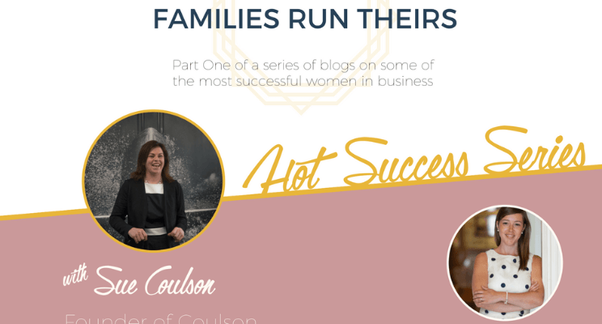|
How does one go about building a written-communications business from scratch? The person who got in touch is looking to break into a sector that I have almost no experience of, so I wondered whether it might stump me.
However, it soon became clear that the problem is not the sector itself but the challenge of being visible in that sector.
Those of us who started out by targeting the publishing industry know that there’s an advantage – that sector knows who we are, what we do, and why it needs us. But what do you do if your target clients are corporates?
Jo says:
Firstly, thank you so much for your extremely helpful articles. They’re all I seem to read at the moment. Secondly, a question! You kindly offer to help people solve their business problems, so here’s mine. I recently set up a communications business offering copywriting, proofreading, editing and social media services. I have a professional background in science, business and education, but not specifically within the communication arena. My last role, as a communications manager, was my first within this sector. I’ve spent 15 years helping my partner with his communication requirements, from proofreading and editing to copywriting, so I feel as experienced as I can in this field without having any ‘official’ training. Now comes the hard bit! I am spending each and every day at the computer, emailing companies that I hope will be able to utilize my services, and the one question I keep hearing, time after time is ‘Can you please send me examples of your work?’ Herein lies the problem. Even though I have worked for many years with my other half, I haven’t built a portfolio of any kind, let alone kept any of the work I contributed to. I’m stuck in that cycle of no provable experience so no work, but no work so no way of demonstrating what I can do! Tricky! How would you suggest I get around this? Thanks for taking the time to read this, and for your insightful advice!
Hi, Jo, and thanks so much for your question!
Your problem is essentially one of visibility, competition, and the lack of a stand-out brand identity. Your website looks lovely, but that’s no longer enough to get you found or noticed. Written-communications businesses are ten a penny, so you’re operating in a marketplace that’s highly competitive. You’re also up against specialist editors (like me) and specialist copywriters (like my pal John Espirian), and a ton of big-brand agencies who offer service packages to corporates (your target market). Currently, despite your pretty website, you’re basically an unknown supplier writing to companies who’ve never heard of you and have no way of working out why you’re special, why you’re different, why they should pick you over anyone else. And none of that is a reflection of your capability. It’s simply a reflection of the fact that you can’t prove it. The consequence is that, at the moment, your message is all about you. You’re not the first supplier to be in the position of having a small or non-existent portfolio. Many of my colleagues have to sign non-disclosure agreements that preclude them from advertising the fact that they’ve worked for corporates. And while my fiction writers are more than happy to make it known that they’ve hired me, I’d never send another author a sample of the work I’ve done on behalf of a former client. It would be a breach of confidentiality. Becoming visible and standing out So what to do? My view is that you need to commit to a content marketing strategy that will build trust and get attention. The briefest definition of content marketing I can give you is this: Creating useful stuff that solves problems … and giving it away. That’s because when you help people, you get noticed. You know this is true because that’s why you contacted me! Let me quote you; ‘Thank you so much for your extremely helpful articles. They’re all I seem to read at the moment.’ Think about it … you’ve never met me or seen a sample of my editing work, and yet you devoured my blog and sent me a long email outlining your problem in the hope that I could help you. Then you agreed to let me publish your name, your question and my response in a public place. Somewhere along the line, I made you trust me. And that, Jo, is what you need to mimic with your own business. You found me, which means my clients can find me. Now you need to enable people to find you and make them want to engage with you and your written-communications business. We’re already 690 words in and I haven’t even got started on the nuts and bolts of content marketing, and there isn’t room to do it justice here. But here are the basic principles. My basic principles of content marketing
When you create solutions to people’s problems – based around these principles – you begin a journey that puts you top of mind and top of the search engines. Changing the focus of the message Remember above how I talked about your message being all about you? When you start content marketing, the message becomes all about the client – their problems, their challenges, their business. And when you offer solutions to those problems via your content marketing strategy, you present yourself as the expert you are – someone with 15 years’ experience of working with a corporate. No one will be looking at your sparse testimonials page if they’re too busy drooling over the free resources you’ve offered them. Then, when it comes to the stuff they can’t do themselves, you’ll be ready to help with paying work. It’s hard graft, make no mistake. There are no quick fixes or overnight solutions. The strategy requires commitment. The principles I outlined above are from my Content Marketing Primer for Editors & Proofreaders, which I wrote at the end of 2016 and published in January 2017. I stand by everything I wrote in that ebook, but I’ve learned a whole lot more since, because I decided to get help from the pros. After all, I’m a professional editor not a professional marketer! And if you want to get serious and make inroads as quickly as possible, you might decide to go for the pro option, too. An example of how content marketing worked … on me The story of the pros I chose provides an example of great content marketing in action. I was looking for free online help with branding and design. I came across a couple of guys on Twitter who were creating video tutorials about how to do just that. They were fun, young (younger than me, for sure!), seemed friendly … and their stuff was brilliant … and free. I watched one vlog after another, and signed up for their mailing list so I’d know when something new was out. For about three months, I took all that free guidance and implemented it. And then I bought from them. Just a book at first. It cost about a tenner. And all the time, I kept thinking: if the free stuff is this good, and this cheap book is this good, what must their membership group be like? By the time April had come around, resistance was futile. Like the Borg. And I joined.
So, you see what happened? They gave away a load of stuff that I found useful, and it got my attention and persuaded me to trust them. And then I became a client because when it came to making the big decision about whom to choose, they were top of mind. They'd blown everyone else out of the water.
So who are they? Regular readers of my blog will be bored rigid of hearing me talk about Andrew and Pete, and their group Atomic, but I won’t apologize because they’ve made a difference to me. What they teach works. If you decide to go down this route though, do your own research first and make your own decisions. Find what’s right for you. An example of a colleague’s content strategy My colleague Natalie Hailey owns a digital marketing agency called Hot Content. And she uses content to drive her marketing strategy, just like I do, just like you can. Natalie has a blog, a vlog and a newsletter through which she’s building an audience of business owners who are interested in her services – her solutions. But she’s not just creating visual and written online content. She’s also delivering those solutions face to face – by speaking at regional events (via her local chamber of commerce) – and by hosting live training sessions and workshops in her area that focus on helping, educating, building relationships and engaging with local businesswomen. She focuses on a core audience and makes sure that the content she creates and delivers speaks to that audience at every touchpoint of her business – from the font she uses for her logo to the colours she chooses for her blog images; from the way she dresses at speaking engagements to the gentle warmth of her voice when she vlogs; from the tone of her blog posts to the way she engages in forums. Those are the things her potential clients focus on. And, ultimately, they choose to engage with her because she makes them want to. And why on earth wouldn’t they? She’s nothing but helpful.
Back to you ...
I think you can do what I do, what Natalie does, what John does, and what Andrew and Pete do, so that you and your written-communications business stand out. By focusing on your target clients, what their problems are, and how you can solve them, and in a way that’s based purely on being helpful, by making them ‘feel smarter or happier’, as Andrew and Pete put it, you can move out of the catch-22 you find yourself in. That’s because this type of marketing is about relationships rather than résumés, about problem-solving rather than portfolios, about answering with solutions rather than asking for work. It’s not that testimonials, portfolios and experience aren’t great. They are. They’re wonderful. But, as you know only too well, they’re what you get at the arrivals gate. Content marketing is the departure point. Do it yourself, do it with books, or do it with pros. But do it. (Gawd, I sound like a Nike advert!). Then you'll be irresistible too. Like the Borg. Good luck!
Louise Harnby is a fiction copyeditor and proofreader who specializes in helping self-publishing writers prepare their novels for market.
She is the author of several books on business planning and marketing for editors, and runs online courses from within the Craft Your Editorial Fingerprint series. She is also an Advanced Professional Member of the Society for Editors and Proofreaders. Louise loves books, coffee and craft gin, though not always in that order. Visit her business website at Louise Harnby | Proofreader & Copyeditor, say hello on Twitter at @LouiseHarnby, or connect via Facebook and LinkedIn. If you're an author, take a look at Louise’s Writing Library and access her latest self-publishing resources, all of which are free and available instantly.
0 Comments
Your comment will be posted after it is approved.
Leave a Reply. |
BLOG ALERTSIf you'd like me to email you when a new blog post is available, sign up for blog alerts!
TESTIMONIALSDare Rogers'Louise uses her expertise to hone a story until it's razor sharp, while still allowing the author’s voice to remain dominant.'Jeff Carson'I wholeheartedly recommend her services ... Just don’t hire her when I need her.'J B Turner'Sincere thanks for a beautiful and elegant piece of work. First class.'Ayshe Gemedzhy'What makes her stand out and shine is her ability to immerse herself in your story.'Salt Publishing'A million thanks – your mark-up is perfect, as always.'CATEGORIES
All
ARCHIVES
July 2024
|
|
|
|


















 RSS Feed
RSS Feed





